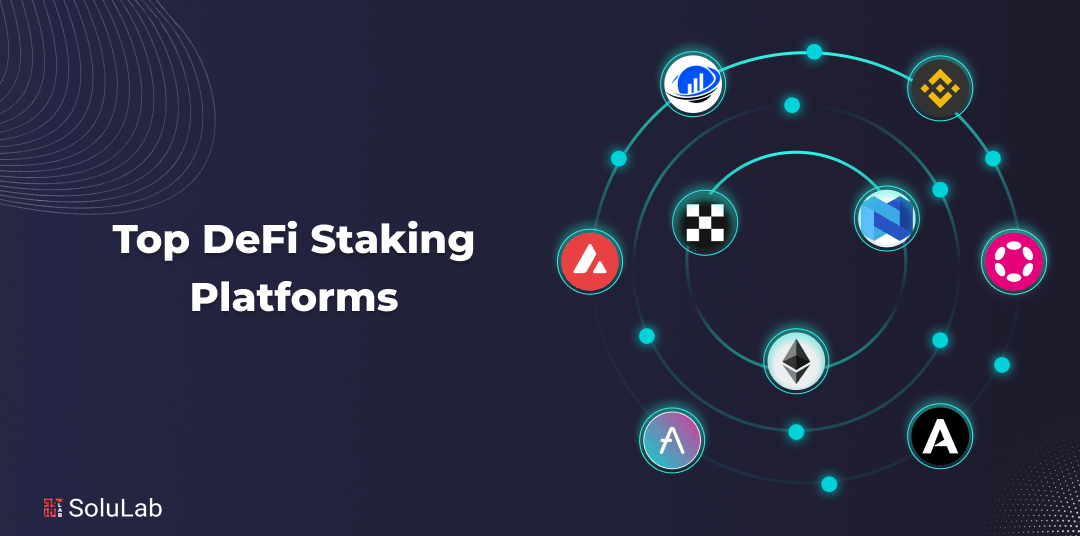
DeFi staking platforms are changing the way we earn from crypto. Instead of just holding tokens and hoping prices go up, you can now lock them into smart contracts and earn passive income, just like earning interest on a savings account, but without the bank.
These platforms operate on decentralized networks, meaning no middlemen, full control of your assets, and transparent reward systems. For daily users, DeFi staking solves a major problem: how to grow your crypto portfolio without trading or risking it all on volatile markets.
With the right platform, you can earn steady rewards by staking your tokens. This blog explores the 9 best DeFi staking platforms to consider in 2025.
What is a DeFi Staking Platform?
A DeFi staking platform is a decentralized application that allows users to lock their cryptocurrency assets into smart contracts to support blockchain network operations, such as transaction validation, and, in return, earn rewards. This process is particularly common in blockchains that utilize a Proof-of-Stake (PoS) consensus mechanism.
However, users should be aware of the risks associated with DeFi staking platform development, including potential losses due to price volatility and smart contract vulnerabilities. As with any DeFi development, conducting thorough research and understanding the risks involved is essential before participating in staking activities.
How DeFi Staking Works?
DeFi staking is a process where you lock your crypto assets into smart contracts on decentralized platforms to support blockchain operations and earn rewards. Here’s a step-by-step breakdown of how it works:
1. Choose a DeFi Staking Platform
Select a decentralized application (dApp) that supports staking for your chosen cryptocurrency. Popular platforms include Coinbase, Binance, and OKX.
2. Deposit Your Tokens
Transfer your crypto assets into the platform’s staking pool or smart contract. This action locks your tokens, making them available for network activities like transaction validation.
3. Select a Validator
Choose a validator node to delegate your staked tokens. Validators are responsible for maintaining the network’s integrity by processing transactions and creating new blocks.
4. Earn Staking Rewards
As your staked tokens contribute to network operations, you earn rewards, typically in the form of additional tokens. These rewards are often distributed automatically and can vary based on factors like staking duration and network performance.
5. Unstake When Ready
After fulfilling any required lock-up periods, you can withdraw your staked tokens along with the earned rewards. Be aware that some platforms may impose waiting periods or fees for unstaking.
Top 9 DeFi Staking Platforms in 2025
1. AQRU
AQRU is a London-based DeFi platform founded in 2021. It offers a user-friendly interface for staking over 200 cryptocurrencies, including popular tokens like DAI, USDC, and Bitcoin. AQRU provides competitive yields, with stablecoins earning up to 12% APY.
The platform focuses on security by partnering with Fireblocks for multi-signature protection and implementing two-factor authentication. Additionally, AQRU offers features like margin trading, advanced order types, and the AQRU Trend product, which uses algorithmic strategies to manage a diversified crypto portfolio.
2. Polkadot
Polkadot, founded in 2016, is a leading multi-chain blockchain platform designed to enable interoperability between different blockchains. Its DeFi staking platform allows users to stake DOT tokens to secure the network and earn rewards through a robust nominated Proof-of-Stake (NPoS) system.
Polkadot’s key features include strong scalability, cross-chain compatibility, and a high level of security, making it a favorite for DeFi enthusiasts seeking both innovation and reliability
3. Avalanche
Avalanche is a Layer-1 blockchain platform developed by Ava Labs, launched in September 2020. It aims to provide a scalable and secure environment for decentralized applications (dApps) and custom blockchain networks.
Avalanche’s architecture features three core blockchains—the X-Chain (Exchange Chain), C-Chain (Contract Chain), and P-Chain (Platform Chain)—working together to manage assets, smart contracts, and network coordination.
4. Ethereum
Ethereum, founded in 2015, is the leading blockchain platform supporting DeFi staking through its transition to Ethereum 2.0’s Proof-of-Stake (PoS) consensus. As the pioneer of smart contracts, Ethereum allows users to stake their ETH to help secure the network and earn rewards.
Its key features include high decentralization, strong security, and a vibrant DeFi ecosystem with numerous staking options via wallets and platforms like Lido and Rocket Pool.
5. Binance
Binance, founded in 2017, is one of the world’s largest and most popular DeFi staking platforms, offering a wide range of staking options for various cryptocurrencies. It provides users with flexible and locked staking plans, competitive rewards, and an easy-to-use interface that supports both beginners and experienced users.
Binance’s DeFi staking service is integrated within its ecosystem, allowing seamless token management and access to other DeFi products.
6. OKX
With a total charge of 0.05% on all trades, OKX is one of the most reasonably priced DeFi staking exchanges available. It is a complete DeFi staking platform that provides traders of all levels with a simple and safe way to purchase, sell, stake, and trade more than 200 distinct currencies and tokens.
OKX integrates various decentralized applications (dApps) through its OKX Wallet, allowing users to stake assets, earn rewards, and participate in governance activities.
7. DeFi Swap
DeFi Swap is a decentralized exchange (DEX) and staking platform built on the Ethereum blockchain. It enables users to trade Ether and ERC-20 tokens securely and anonymously without relying on intermediaries.
The platform offers features like an arbitrage function for capitalizing on price differences and incentivized liquidity pools where users can stake tokens to earn rewards.
8. Nexo
Nexo is a regulated DeFi platform launched in 2018 that offers crypto staking, lending, and high-yield savings. Users can earn up to 16% APY on assets with daily interest payouts. It supports Ethereum smart staking and features a loyalty rewards program. Nexo is known for its strong security, ease of use, and wide asset support.
9. AAve
Aave, launched in 2017 by Stani Kulechov as ETHLend, rebranded in 2018 to become a leading DeFi protocol. It enables users to lend and borrow cryptocurrencies through decentralized liquidity pools, eliminating intermediaries. Key features include flash loans, overcollateralized borrowing, and aTokens that accrue real-time interest.
Governed by AAVE token holders, the platform focuses on transparency and user control. Operating across multiple networks like Ethereum and Polygon, Aave has secured billions in total value locked, reflecting its significant role in the DeFi ecosystem.
Conclusion
DeFi staking is transforming how crypto holders earn passive income—securely, transparently, and without intermediaries. The 9 platforms we’ve covered offer a mix of high yields, flexible terms, and solid reputations, making them ideal picks for 2025.
Whether you’re a seasoned investor or just starting, there’s a platform tailored to your needs. But remember, returns come with risks, so always research and diversify.
As the DeFi space continues to grow, staking remains one of the smartest ways to put your crypto to work. NovaPay Nexus, a self-hosted cryptocurrency payment processor, partnered with SoluLab to overcome challenges in blockchain integration, security, and user adoption. SoluLab improved multi-crypto compatibility, security for private keys, and crafted an intuitive UI. The result? A secure, fee-free, and decentralized payment ecosystem empowering businesses to accept digital currencies directly, without intermediaries.
SoluLab, a DeFi staking platform development company can help you with the best solutions while offering expert guidance. Contact us today to discuss further.
FAQs
1. How does staking work on deFi platforms?
Staking on DeFi platforms involves depositing your tokens into a staking pool or smart contract. These tokens are used to validate transactions and secure the network. In return for your contribution, you receive staking rewards, which can be in the form of a native token or other incentives.
2.What are the benefits of staking on deFi platforms?
Staking on DeFi platforms offers several benefits, including earning passive income, participating in network governance, and contributing to network security. It’s a way for token holders to be actively involved in the ecosystem while receiving rewards for their support.
3. Which tokens can I stake on deFi platforms?
DeFi staking platforms typically support a variety of tokens, including popular cryptocurrencies like Ethereum (ETH), Binance Coin (BNB), and Cardano (ADA), among others. The specific tokens available for staking may vary from one platform to another.
4. How are staking rewards calculated?
Staking rewards are calculated based on factors such as the amount of tokens you stake, the duration of your staking, and the overall network performance. Some platforms offer fixed staking rewards, while others have variable rewards based on network activity.
5. How much passive income can users/traders generate from DeFi staking platforms?
Passive income from DeFi staking depends on the platform and the cryptocurrency you choose. On average, returns range between 5% and 20% per year. For the most accurate numbers, always check the current rates on the specific platform.




